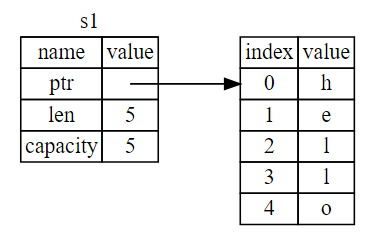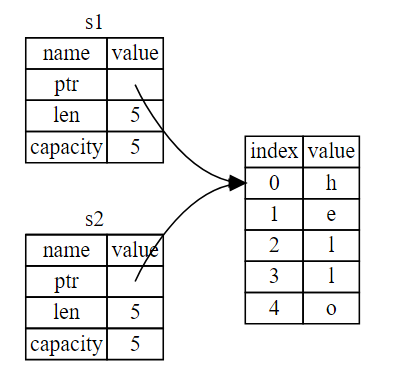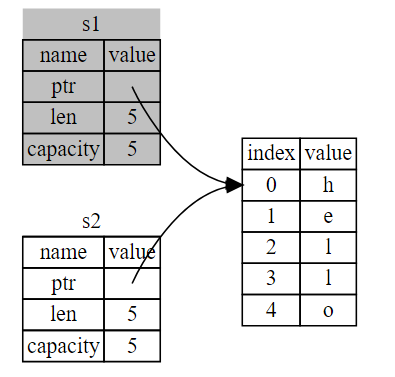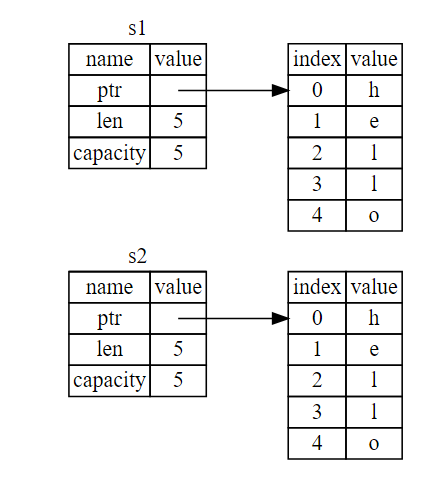2.4 Rust Ownership
What Is Ownership
ownership这个单词有些不好翻译,刚开始就直接叫它“ownership”即可。这里简单说一下,我对它的理解,
从“数据结构与算法”的角度来看,ownership显然不是数据,那么它就一定是数据之间的关系;在这里,它描述了变量、变量在内存(栈与堆)上的地址、复合类型的引用、简单类型的复制、变量的作用范围(生命周期)等概念以及它们之间的关系。
下面为官方描述:
All programs have to manage the way they use a computer’s memory while running. Some languages have garbage collection that constantly looks for no longer used memory as the program runs; in other languages, the programmer must explicitly allocate and free the memory. Rust uses a third approach: memory is managed through a system of ownership with a set of rules that the compiler checks at compile time. None of the ownership features slow down your program while it’s running.
Because ownership is a new concept for many programmers, it does take some time to get used to. The good news is that the more experienced you become with Rust and the rules of the ownership system, the more you’ll be able to naturally develop code that is safe and efficient. Keep at it!
栈与堆
栈:数据的操作永远在栈顶,不需要内存寻址;定长;
In many programming languages, you don’t have to think about the stack and the heap very often. But in a systems programming language like Rust, whether a value is on the stack or the heap has more of an effect on how the language behaves and why you have to make certain decisions. Parts of ownership will be described in relation to the stack and the heap later in this chapter, so here is a brief explanation in preparation.
Both the stack and the heap are parts of memory that are available to your code to use at runtime, but they are structured in different ways. The stack stores values in the order it gets them and removes the values in the opposite order. This is referred to as last in, first out. Think of a stack of plates: when you add more plates, you put them on top of the pile, and when you need a plate, you take one off the top. Adding or removing plates from the middle or bottom wouldn’t work as well! Adding data is called pushing onto the stack, and removing data is called popping off the stack.
The stack is fast because of the way it accesses the data: it never has to search for a place to put new data or a place to get data from because that place is always the top. Another property that makes the stack fast is that all data on the stack must take up a known, fixed size.
Data with a size unknown at compile time or a size that might change can be stored on the heap instead. The heap is less organized: when you put data on the heap, you ask for some amount of space. The operating system finds an empty spot somewhere in the heap that is big enough, marks it as being in use, and returns a pointer, which is the address of that location. This process is called allocating on the heap, sometimes abbreviated as just “allocating.” Pushing values onto the stack is not considered allocating. Because the pointer is a known, fixed size, you can store the pointer on the stack, but when you want the actual data, you have to follow the pointer.
Think of being seated at a restaurant. When you enter, you state the number of people in your group, and the staff finds an empty table that fits everyone and leads you there. If someone in your group comes late, they can ask where you’ve been seated to find you.
Accessing data in the heap is slower than accessing data on the stack because you have to follow a pointer to get there. Contemporary processors are faster if they jump around less in memory. Continuing the analogy, consider a server at a restaurant taking orders from many tables. It’s most efficient to get all the orders at one table before moving on to the next table. Taking an order from table A, then an order from table B, then one from A again, and then one from B again would be a much slower process. By the same token, a processor can do its job better if it works on data that’s close to other data (as it is on the stack) rather than farther away (as it can be on the heap). Allocating a large amount of space on the heap can also take time.
When your code calls a function, the values passed into the function (including, potentially, pointers to data on the heap) and the function’s local variables get pushed onto the stack. When the function is over, those values get popped off the stack.
Keeping track of what parts of code are using what data on the heap, minimizing the amount of duplicate data on the heap, and cleaning up unused data on the heap so you don’t run out of space are all problems that ownership addresses. Once you understand ownership, you won’t need to think about the stack and the heap very often, but knowing that managing heap data is why ownership exists can help explain why it works the way it does.
ownership rules
As a first example of ownership, we’ll look at the scope of some variables. A scope is the range within a program for which an item is valid. Let’s say we have a variable that looks like this:
let s = "hello";
The variable s refers to a string literal, where the value of the string is hardcoded into the text of our program. The variable is valid from the point at which it’s declared until the end of the current scope. Listing 4-1 has comments annotating where the variable s is valid.
{ // s is not valid here, it’s not yet declared
let s = "hello"; // s is valid from this point forward
// do stuff with s
} // this scope is now over, and s is no longer valid
In other words, there are two important points in time here:
- When
scomes into scope, it is valid. - It remains valid until it goes out of scope.
At this point, the relationship between scopes and when variables are valid is similar to that in other programming languages. Now we’ll build on top of this understanding by introducing the Stringtype.
String类型
String是rust中的字符串类型,可追加拼接;"abc"这种写法在rust中叫“字符串字面量”,等效于常量。它们之间的转化:
let s = String::from("abc");
let s: String = "abc".to_string();
We’ve already seen string literals(比如"this is a string literals"), where a string value is hardcoded into our program. String literals are convenient, but they aren’t suitable for every situation in which we may want to use text. One reason is that they’re immutable. Another is that not every string value can be known when we write our code: for example, what if we want to take user input and store it? For these situations, Rust has a second string type, String. This type is allocated on the heap and as such is able to store an amount of text that is unknown to us at compile time. You can create a String from a string literal using the from function, like so:
let s = String::from("hello");
The double colon (::) is an operator that allows us to namespace this particular from function under the String type rather than using some sort of name like string_from.
let mut s = String::from("hello");
s.push_str(", world!"); // push_str() appends a literal to a String
println!("{}", s); // This will print `hello, world!`
So, what’s the difference here? Why can String be mutated but literals cannot? The difference is how these two types deal with memory.
内存分配
In the case of a string literal, we know the contents at compile time, so the text is hardcoded directly into the final executable. This is why string literals are fast and efficient. But these properties only come from the string literal’s immutability. Unfortunately, we can’t put a blob of memory into the binary for each piece of text whose size is unknown at compile time and whose size might change while running the program.
With the String type, in order to support a mutable, growable piece of text, we need to allocate an amount of memory on the heap, unknown at compile time, to hold the contents. This means:
- The memory must be requested from the operating system at runtime.
- We need a way of returning this memory to the operating system when we’re done with our
String.
That first part is done by us: when we call String::from, its implementation requests the memory it needs. This is pretty much universal in programming languages. However, the second part is different. In languages with a garbage collector (GC), the GC keeps track and cleans up memory that isn’t being used anymore, and we don’t need to think about it. Without a GC, it’s our responsibility to identify when memory is no longer being used and call code to explicitly return it, just as we did to request it. Doing this correctly has historically been a difficult programming problem. If we forget, we’ll waste memory. If we do it too early, we’ll have an invalid variable. If we do it twice, that’s a bug too. We need to pair exactly one allocate with exactly one free.
Rust takes a different path: the memory is automatically returned once the variable that owns it goes out of scope
{
let s = String::from("hello"); // s is valid from this point forward
// do stuff with s
} // this scope is now over, and s is no
// longer valid
There is a natural point at which we can return the memory our String needs to the operating system: when s goes out of scope. When a variable goes out of scope, Rust calls a special function for us. This function is called drop, and it’s where the author of String can put the code to return the memory. Rust calls drop automatically at the closing curly bracket.
Note: In C++, this pattern of deallocating resources at the end of an item’s lifetime is sometimes called Resource Acquisition Is Initialization (RAII). The drop function in Rust will be familiar to you if you’ve used RAII patterns.
This pattern has a profound impact on the way Rust code is written. It may seem simple right now, but the behavior of code can be unexpected in more complicated situations when we want to have multiple variables use the data we’ve allocated on the heap. Let’s explore some of those situations now.
Ways Variables and Data Interact:Move
简单类型
let x = ;
let y = x;
We can probably guess what this is doing: “bind the value to x; then make a copy of the value in x and bind it to y.” We now have two variables, x and y, and both equal . This is indeed what is happening, because integers are simple values with a known, fixed size, and these two values are pushed onto the stack.
字符串
let s1 = String::from("hello");
let s2 = s1;
A String is made up of three parts, shown on the left: a pointer to the memory that holds the contents of the string, a length, and a capacity. This group of data is stored on the stack. On the right is the memory on the heap that holds the contents.

The length is how much memory, in bytes, the contents of the String is currently using. The capacity is the total amount of memory, in bytes, that the String has received from the operating system.
When we assign s1 to s2, the String data is copied, meaning we copy the pointer, the length, and the capacity that are on the stack. We do not copy the data on the heap that the pointer refers to.

Earlier, we said that when a variable goes out of scope, Rust automatically calls the drop function and cleans up the heap memory for that variable. This is a problem: when s2 and s1 go out of scope, they will both try to free the same memory. This is known as a double free error and is one of the memory safety bugs we mentioned previously. Freeing memory twice can lead to memory corruption, which can potentially lead to security vulnerabilities.
To ensure memory safety, there’s one more detail to what happens in this situation in Rust. Instead of trying to copy the allocated memory, Rust considers s1 to no longer be valid and, therefore, Rust doesn’t need to free anything when s1 goes out of scope. Check out what happens when you try to use s1 after s2 is created; it won’t work:
fn main() {
let s1 = String::from("不见得繁华");
let _s2 = s1;
println!("{}, 怎会明白平淡的好!", s1);
}
You’ll get an error like this because Rust prevents you from using the invalidated reference
[root@itoracle ownership]# cargo run
Compiling ownership v0.1.0 (/usr/local/automng/src/rust/test/ownership)
error[E0382]: borrow of moved value: `s1`
--> src/main.rs::
|
| let _s2 = s1;
| -- value moved here
|
| println!("{}, 怎会明白平淡的好!", s1);
| ^^ value borrowed here after move
|
= note: move occurs because `s1` has type `std::string::String`, which does not implement the `Copy` trait error: aborting due to previous error
If you’ve heard the terms shallow copy and deep copy while working with other languages, the concept of copying the pointer, length, and capacity without copying the data probably sounds like making a shallow copy. But because Rust also invalidates the first variable, instead of being called a shallow copy, it’s known as a move.

That solves our problem! With only s2 valid, when it goes out of scope, it alone will free the memory, and we’re done.
In addition, there’s a design choice that’s implied by this: Rust will never automatically create “deep” copies of your data. Therefore, any automatic copying can be assumed to be inexpensive in terms of runtime performance.
补充说明:with only s2 valid,这句话很重要,是ownership的核心理念之一;当你把s1指向s2后,s1的作用域并没有消失,只是不合法了,不能再使用了;任何对s1的引用,都不允许;s1在栈中的位置,s1指向的堆地址没有变,只是s1 不再具备ownership关系,在rust的概念中,以后只有s2,不能再通过s1做任何操作了。
Ways Variables and Data Interact:Clone
If we do want to deeply copy the heap data of the String, not just the stack data, we can use a common method called clone.
let s1 = String::from("hello");
let s2 = s1.clone();
println!("s1 = {}, s2 = {}", s1, s2);

Stack-Only Data:Copy
let x = ;
let y = x; println!("x = {}, y = {}", x, y);
But this code seems to contradict what we just learned: we don’t have a call to clone, but x is still valid and wasn’t moved into y.
The reason is that types such as integers that have a known size at compile time are stored entirely on the stack, so copies of the actual values are quick to make. That means there’s no reason we would want to prevent x from being valid after we create the variable y. In other words, there’s no difference between deep and shallow copying here, so calling clone wouldn’t do anything different from the usual shallow copying and we can leave it out.
So what types are Copy? You can check the documentation for the given type to be sure, but as a general rule, any group of simple scalar values can be Copy, and nothing that requires allocation or is some form of resource is Copy. Here are some of the types that are Copy:
- All the integer types, such as
u32. - The Boolean type,
bool, with valuestrueandfalse. - All the floating point types, such as
f64. - The character type,
char. - Tuples, if they only contain types that are also
Copy. For example,(i32, i32)isCopy, but(i32, String)is not.
Ownership and functions
fn main() {
let s = String::from("hello"); // s comes into scope
takes_ownership(s); // s's value moves into the function...
// ... and so is no longer valid here
let x = ; // x comes into scope
makes_copy(x); // x would move into the function,
// but i32 is Copy, so it’s okay to still
// use x afterward
} // Here, x goes out of scope, then s. But because s's value was moved, nothing
// special happens.
fn takes_ownership(some_string: String) { // some_string comes into scope
println!("{}", some_string);
} // Here, some_string goes out of scope and `drop` is called. The backing
// memory is freed.
fn makes_copy(some_integer: i32) { // some_integer comes into scope
println!("{}", some_integer);
} // Here, some_integer goes out of scope. Nothing special happens.
If we tried to use s after the call to takes_ownership, Rust would throw a compile-time error. These static checks protect us from mistakes. Try adding code to main that uses s and x to see where you can use them and where the ownership rules prevent you from doing so.
Return Values and Scope
fn main() {
let _s1 = gives_ownership(); // gives_ownership moves its return
// value into s1
let _s2 = String::from("hello"); // s2 comes into scope
let _s3 = takes_and_gives_back(_s2); // s2 is moved into
// takes_and_gives_back, which also
// moves its return value into s3
} // Here, s3 goes out of scope and is dropped. s2 goes out of scope but was
// moved, so nothing happens. s1 goes out of scope and is dropped.
fn gives_ownership() -> String { // gives_ownership will move its
// return value into the function
// that calls it
let some_string = String::from("hello"); // some_string comes into scope
some_string // some_string is returned and
// moves out to the calling
// function
}
// takes_and_gives_back will take a String and return one
fn takes_and_gives_back(a_string: String) -> String { // a_string comes into
// scope
a_string // a_string is returned and moves out to the calling function
}
The ownership of a variable follows the same pattern every time: assigning a value to another variable moves it. When a variable that includes data on the heap goes out of scope, the value will be cleaned up by drop unless the data has been moved to be owned by another variable.
fn main() {
let s1 = String::from("hello");
let (s2, len) = calculate_length(s1);
println!("The length of '{}' is {}.", s2, len);
}
fn calculate_length(s: String) -> (String, usize) {
let length = s.len(); // len() returns the length of a String
(s, length)
}
[root@itoracle ownership]# cargo run
Compiling ownership v0.1.0 (/usr/local/automng/src/rust/test/ownership)
Finished dev [unoptimized + debuginfo] target(s) in .01s
Running `target/debug/ownership`
The length of 'hello' is .
上面这两句话非常重要,是rust的核心理念之一,下面拆解多句再次强调一下。
rust变量之间的ownership每次都遵守下面的模式规则:
一个变量,在堆中分配了空间,空间中存放着数据,那这些数据什么时间释放?在作用域消失的时候,自动释放。
在作用域消失的时候,变量的值被清空(占用内存被释放),其ownership关系被rust自动drop。
除非……不会再次释放。除非这个变量已经被移动到另外一个变量中了。
为什么被移动到另外一个变量中就不再释放了呢?
因为rust的移动,是ownership关系的移动,变量的值,在内存中的地址,存放的数据是没有变化的;
一个变量移动到另外一个变量,变化的是ownership关系,数据还是那一份数据,只是这份数据归新变量拥有了。
所以释放的时候,只释放最新拥有这些内存数据的变量即可。
在rust中,一个变量内存数据的分配只有一次,释放也只有一次,所以才有这个除非。
这文章是自己阅读官方文档时做的笔记,自己反反复复琢磨修饰不下十遍了,随着对rust理解的加深,个人认为 rust "ownership" 可以翻译为 rust “所属关系”,其精华可以概括为“变量移动,数据不动”。
2.4 Rust Ownership的更多相关文章
- rust ownership 系统
### 对象销毁规则 未被使用的函数返回值 被let绑定的值, 在函数末尾销毁,除非被moved ``` let v = obj::new("a"); other_fun(v); ...
- rust 参考的资料 转
http://blog.csdn.net/loveisasea/article/details/46292715 rust官方学习文档: 1.http://doc.rust-lang.org/book ...
- Rust语言的多线程编程
我写这篇短文的时候,正值Rust1.0发布不久,严格来说这是一门兼具C语言的执行效率和Java的开发效率的强大语言,它的所有权机制竟然让你无法写出线程不安全的代码,它是一门可以用来写操作系统的系统级语 ...
- Rust: move和borrow
感觉Rust官方的学习文档里关于ownship,borrow和lifetime介绍的太简略了,无法真正理解这些语法设计的原因以及如何使用(特别是lifetime).所以找了一些相关的blog来看,总结 ...
- Rust语言:安全地并发
http://www.csdn.net/article/2014-02-26/2818556-Rust http://www.zhihu.com/question/20032903 Rust是近两年M ...
- Rust笔记
前言: 学了有段时间了,现在同步到博客园. 正文: Rust语言介绍 l Rust由js之父开发的新型语言,打破了传统的难以接触底层的局面.这是个有C++开发的语言.拥有C的血统 l Rust必须严格 ...
- Rust到底值不值得学--Rust对比、特色和理念
前言 其实我一直弄不明白一点,那就是计算机技术的发展,是让这个世界变得简单了,还是变得更复杂了. 当然这只是一个玩笑,可别把这个问题当真. 然而对于IT从业者来说,这可不是一个玩笑.几乎每一次的技术发 ...
- Rust入坑指南:核心概念
如果说前面的坑我们一直在用小铲子挖的话,那么今天的坑就是用挖掘机挖的. 今天要介绍的是Rust的一个核心概念:Ownership.全文将分为什么是Ownership以及Ownership的传递类型两部 ...
- Rust入坑指南:鳞次栉比
很久没有挖Rust的坑啦,今天来挖一些排列整齐的坑.没错,就是要介绍一些集合类型的数据类型."鳞次栉比"这个标题是不是显得很有文化? 在Rust入坑指南:常规套路一文中我们已经介绍 ...
随机推荐
- Express响应方法
下表中响应对象(res)的方法向客户端返回响应,终结请求响应的循环.如果在路由句柄中一个方法也不调用,来自客户端的请求会一直挂起. 方法 描述 res.download() 提示下载文件. res.e ...
- schedule与scheduleAtFixedRate比较
schedule与scheduleAtFixedRate: 不延时: schedule(TimerTask, Date runDate, long period)方法任务不延时----Date类型 i ...
- opencv 基本数据结构
转自:http://www.cnblogs.com/guoqiaojin/p/3176692.html opencv 基本数据结构 DataType : 将C++数据类型转换为对应的opencv数 ...
- 算法Sedgewick第四版-第1章基础-2.1Elementary Sortss-006归并排序(Mergesort)
一. 1.特点 (1)merge-sort : to sort an array, divide it into two halves, sort the two halves (recursivel ...
- Excel课程学习
1.Excel软件简介 1.1历史上的其他数据处理软件与Microsoft Excel 1977年,苹果公司开发了一款数据处理软件,当时这款软件卖的非常好,用软件的尾巴摇动硬件的狗,当时有人因为这款软 ...
- Batch Normalization 与Dropout 的冲突
BN或Dropout单独使用能加速训练速度并且避免过拟合 但是倘若一起使用,会产生负面效果. BN在某些情况下会削弱Dropout的效果 对此,BN与Dropout最好不要一起用,若一定要一起用,有2 ...
- ISE 14.7 XST.exe stop working
http://www.xilinx.com/support/answers/59851.html Description XST completes but then instead of retur ...
- 阿里云ECS centos7.2 支持IPv6
公司的项目因为服务器没有支持IPv6而被appstore给退回来了 第一部分 第一步:编辑 /etc/sysctl.conf 文件,将其中三条禁用IPv6的设置更改为: 第二步:使用命令启动启用IPv ...
- IIS并发
https://www.cnblogs.com/xinaixia/p/5945678.html
- myql 服务启动不了怎么办
今天,不小心手动将mysql 服务停掉后,怎么也启动不了,后面查了半天 ,终于知道要先将任务管理器里的mysql.exe 先Kill掉,然后可以启动了,记录一下
